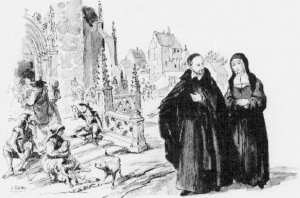 “I would truly like to know how you really are.”
“I would truly like to know how you really are.”
Take a moment to remember how many times you have greeted somebody over the last day. How many times have you asked the question, “How are you?”
In our fast-paced society, it is easy for this question to get lost in the flurry as we respond with a simple “fine.” In their written correspondence, we can see that Louise and Vincent paused to check in on one another. In one letter, as she was inquiring about Vincent’s health, Louise wrote, “I would truly like to know how you really are.”
Showing care and interest in the well-being of one another is at the heart of Vincentian personalism. When we take time to be present to those around us and hear how they are really doing, we honor their dignity and personhood.
How can you take time today to be truly present to those in your life – whether in your workplace, local community or family?
Reflection by:
Emily LaHood-Olsen, Ministry Coordinator for Service Immersions, Division of Mission and Ministry
Citation:
Letter 649. Monsieur Vincent. January 4, 1660. Spiritual Writings of Louise de Marillac, page 671.